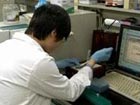| Videos | ? Latest |
|
? Feature | ? Sports | ? Your Videos |
S.Korea develop new cell-phone tech to diagnose disease

 0 Comment(s)
0 Comment(s) Print
Print E-mail
CNTV, January 30, 2012
E-mail
CNTV, January 30, 2012
South Korean scientists have developed new cell-phone technology designed to diagnose disease.
A team at the Korea Advanced Institute of Science and Technology say that when their technology is commercialised, it will revolutionise diagnostic medicine around the world.
There wasn't so long ago, when mobile telephones were designed simply to make and receive telephone calls.
Now, they can be used for navigation, taking photographs, playing video games, among a host of other applications. But the next generation looks set to take Smartphone technology into another realm - medicine and a new era of self-diagnosis.
South Korean scientists say they have developed new technology that will allow cell-phones to diagnose a range of diseases, from cancer to diabetes. Exposing a Smartphone's touchscreen to a droplet of blood or saliva, can produce an instant diagnosis.
This technology was developed around the touchscreen's ability to detect the minute electrical signals generated the touch of a fingertip, a process known as "capacitive sensitivity."
South Korean professor Park Hyun Gyu said, "From the understanding that biomolecules have electrical characteristics according to their concentration, we started with the idea that certain proteins and DNA can be detected in the same way as a finger touch's electrical signal is detected."
The team sees a huge market for their cellphone diagnosis technology. Once it's moved beyond the laboratory, they say it could transform diagnostic techniques, while at the same time, saving billions in healthcare costs.
The team envisages the technology being applied to inexpensively diagnose diseases in environments like nursing homes or mobile clinics.
Park Hyun Gyu said, "Smartphones are already everywhere, so this technology can be developed for individuals to check their health condition, detecting cancer markers or glucose at home in the future,"
The idea of exposing a cellphone touchscreen to saliva or blood may not appeal to many in today's cellphone generation, but scientists say it will one day save time, money and lives.





